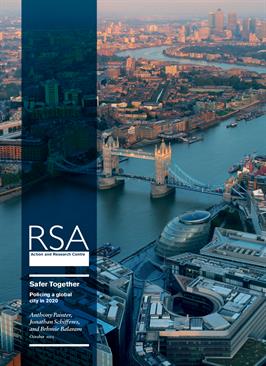The RSA was commissioned by the Metropolitan Police on an independent basis to look at how the service could adapt to the many changes and challenges it will face over the next five years and more.
'Safer together: policing a global city in 2020' is an analysis based on an extensive consultation, wide-ranging research, and the RSA’s public service and institutional reform specialisms. It is an ambitious set of proposals to generate a public conversation about the future of London’s safety – a critical component of its success as a global city.
Following an extensive engagement with 500 of the most senior Met officers and others throughout the service and a consultation involving more than seventy external organisations, Safer Together establishes a shared mission. This mission involves public agencies, the voluntary sector, companies, the public and the police themselves.
In a context of severe budgetary constraints and a changing pattern of crime, which is becoming more complex, the risk for London is that all those involved in its safety could be overwhelmed. The report outlines an approach that relies on deeper co-operation, better use of information and ‘what works’ analysis, and more extensive engagement of the police with London’s communities and members of the public who need its support.
The RSA proposes:
- A Community Safety Index for London that will combine objective measures of crime and incidence of risk and harm with subjective measures such as feelings of safety, absence of anti-social behaviour and neighbourhood quality.
- A London Policing Impact Unit that would combine operational, academic, and strategic knowledge. The Impact Unit would analyse data and learn from on-the-ground experience of ‘what works’. These lessons would then be applied in the Met. A representative Citizens’ Panel would inform its work.
- New forms of collective impact to focus on particular challenges should be extended. These will broaden and widen the Multi-Agency Safeguarding Hub approach where agencies work in close cooperation. This means a permanent engagement on shared issues of concern such as domestic violence, mental health, or anti-social behaviour.
- A deepening of the Met’s engagement with victims and witnesses, for example through greater deployment of restorative justice and greater analysis of victim needs and more continuous communication with them. Only through devolution of more powers over the criminal justice system to London can this take place convincingly. And there is a need for deeper community engagement – especially through the Safer Neighbourhood Boards and through the smart use of social media.
'Safer Together' is a considered yet ambitious response to the challenges of next few years in London. It provides a wider lens for current concerns on the future of public services and the public’s relationship with them. It will be of interest to all those involved in changes to the public sector and those who rely on these changes succeeding – the public themselves.
Blog: A shared mission for the police, public services and the people
pdf 1.1 MB
Contributors



